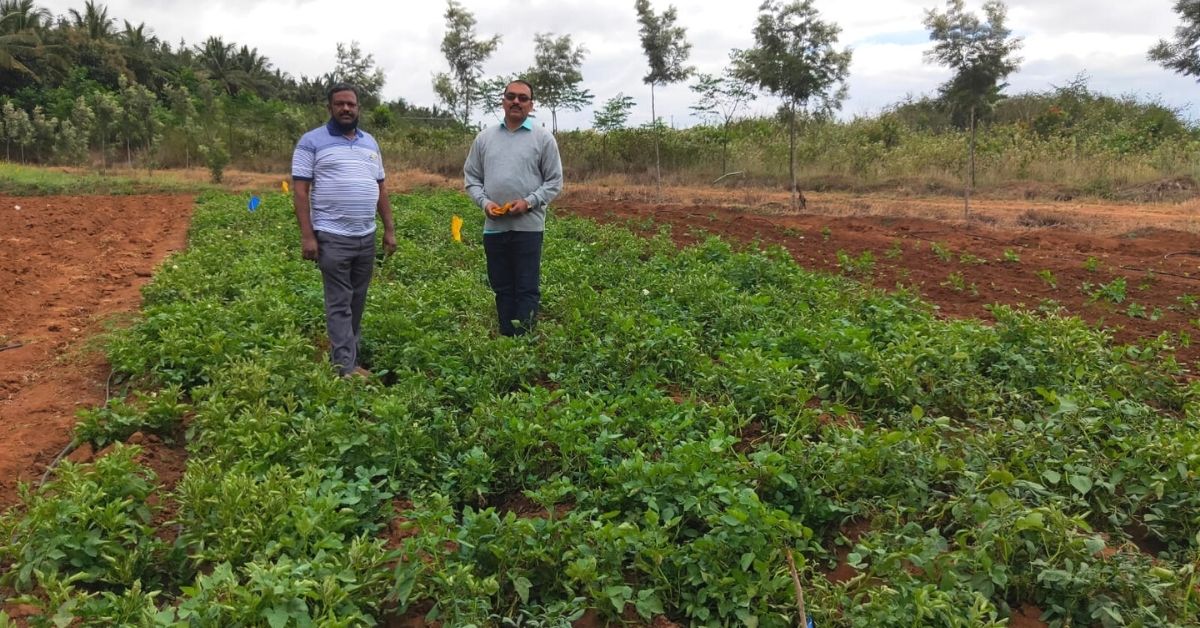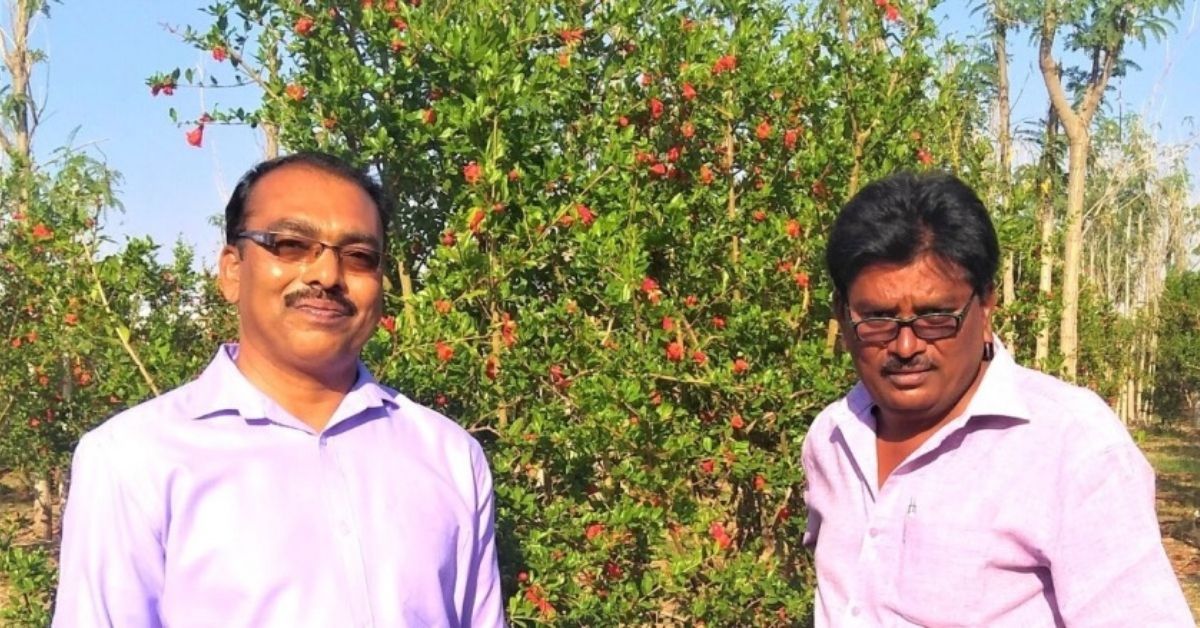Biochemist Dr Jagadeesh Henjarappa lived the corporate life for almost a decade before embarking upon his entrepreneurial journey.
The graduate of Central Food Technology Research Institute in Mysuru says he wanted to use his professional skills to conceive an environment friendly model that could help farmers.
“I belong to a farming background, and have seen my father struggle throughout his life. Be it droughts or erratic rainfall, he bore the brunt of all types of extreme weathers, and suffered losses for years,” he tells The Better India.
So in 2011, Dr Jagadeesh took the plunge to start his own business to help farmers increase yield, and subsequently, their income.
Boosting plant productivity

He says, “The first green revolution arrived decades ago, and promised an increase of agricultural production using hybrid seeds. However, in recent years, farmers have been struggling to increase their output beyond a certain limit. This is due to stagnancy in the sector, alongside improper or excessive use of chemical fertilisers, which affect soil health.”
Dr Jagadeesh says India is one of the largest producers of food grains in the world, but has not been able to incentivise farming methods to achieve further growth. “I believe this is the issue of excess photo transpiration among plants that remains unattended,” he says.
He explains that is a complacency in the Calvin Cycle that plants undergo during photosynthesis.
In the Calvin Cycle, plants and algae convert carbon dioxide present in the air into sugar, and eventually prepare food. It involves four stages — namely, carbon fixation, reduction phase, carbohydrate formation, and regeneration phase.
“Plant growth and production can increase significantly if the photosynthesis process is enhanced. I focussed my work on the same to conceive a product, ‘Suryashakti’, that assists plants in photosynthesis. Better health also helps with better immunity against pest and insect attacks,” he explains.
Dr Jagadeesh says, “RuBisCO and photosystem in plants play a crucial role in assimilating CO2. I extracted specific enzymes and proteins associated directly or indirectly with the photosynthesis process. The key element is the RuBisCO (ribulose-1.5-bisphosphate carboxylase/oxygenase), which has catalytic properties. It assists the carbon dioxide fixation from the atmosphere and subsequently converts simple sugars.”
The other step involves capturing and converting solar radiation into chemical energy, wherein plants use adenosine triphosphate (ATP) and nicotinamide adenine dinucleotide phosphate (NADPH+) for fixation and reduction of CO2 to produce carbohydrates.
“My product consists of two formulations, named RuBisCO-ACT and Photon MAX, which modulate activities of enzymes and proteins responsible for photosynthesis. The products need to be applied to the roots and leaves,” he says.
Dr Jagadeesh says the RuBisCO-ACT product functions to activate and stabilise enzymes and non-enzyme proteins that play a role in photosynthesis, including RuBisCO.
“Using the product results in faster structural remodelling of enzymes to participate in successive carbon dioxide fixation and minimising wasteful reactions. RuBisCO also demands repeated conformational modelling to stay active. It is a process that slows the apparent catalysis rate, resulting in compromising photosynthetic productivity. Regulating RuBisCO plays a significant role in improving crop photosynthesis, and thereby, yield,” he adds.
The second formulation, Photon MAX, functions to improve the sunlight absorption capacity of plants through leaves. “It does this by improving the number of active chloroplasts per unit area of the leaves. It further supports the efficient transfer of absorbed solar energy from antenna molecules to energy centres, which results in conversion of radiation energy to biochemical energy, that is, ATP and NADPH+,” he says.
Dr Jagadeesh adds that he had researched in the area while pursuing his masters in science in 1997, but only took it forward in 2012.
In 2016, he established Athreya Global Solutions with five partners, and commercially started selling the products from 2017-18. “We conducted trials with paddy, cotton, sugarcane, pomegranate, tomato, eggplant and other cash crops, as well as plantations like coconut and areca nut. The average yield of crops increased by 35 per cent, and the product quality improved by 70 per cent,” he adds.
In the past five years, about 500 farmers from Karnataka, Tamil Nadu, Gujarat and others have benefitted with this product, covering over 700 acres of farmland.
An increase in income
Mruthyunjaya Angadi, a coconut farmer from Karnataka, says, “My crop was dying due to stem bleeding disease. I consulted experts and scientists from Krishi Vigyan Kendra and other government agencies. But they suggested I clear the plantation. I was not convinced with their solution and did not want to give up my plants.”
Angadi then learned about Dr Jagadeesh’s products. “My plants, which had almost died, are now bearing fruits. Today, I have 80 to 100 coconuts on each tree, which are expected to increase to near 150. I did not require the use of fertilisers or urea to facilitate any growth due to such impressive results. I have also recommended the products to other farmers,” he adds.
Meanwhile, pomegranate farmer Sarun Thomas says, “Using the Suryashakti product has helped my plants bear more fruits, and reduced flower drops during the growth stage. The size of the fruit is better compared to non-treated pomegranate plants. The product also improved the sweetness and colour of the arils.”
He adds that the product also helped keep diseases like bacterial blight, dieback, fruit rot, wilt, and leaf blight at bay. “I harvested 35 per cent more yield after using the products,” he says.
Dr Jagadeesh notes that having adequate irrigation is key to reaping significant benefits from the products. “The products are applicable during the early growth stages,” he adds.
Speaking of challenges, he says that his innovative prediction is unique, and farmers find it difficult to trust his products. “Many farmers have been misguided by other agriculture businesses promising better yields. Hence, they are not in a position to trust,” he says.
Moreover, farmers only seek solutions when they face problems, he adds. “So I have to wait for them to approach me and share their problems, expecting a solution. It is difficult to knock at someone’s door and promise to rejuvenate their farms, as they may not see the need for it,” he adds.
Dr Jagadeesh feels confident that his products can help increase farmers’ income up to 80 per cent. “The Central government aims to double farmers’ income, and these products can help reach that goal. I hope more farmers benefit from my innovation,” he says.
Source:
Agriculture stagnant in India
Calvin cycle
Edited by Divya Sethu
If you found our stories insightful, informative, or even just enjoyable, we invite you to consider making a voluntary payment to support the work we do at The Better India. Your contribution helps us continue producing quality content that educates, inspires, and drives positive change.
Choose one of the payment options below for your contribution-
By paying for the stories you value, you directly contribute to sustaining our efforts focused on making a difference in the world. Together, let's ensure that impactful stories continue to be told and shared, enriching lives and communities alike.
Thank you for your support. Here are some frequently asked questions you might find helpful to know why you are contributing?

